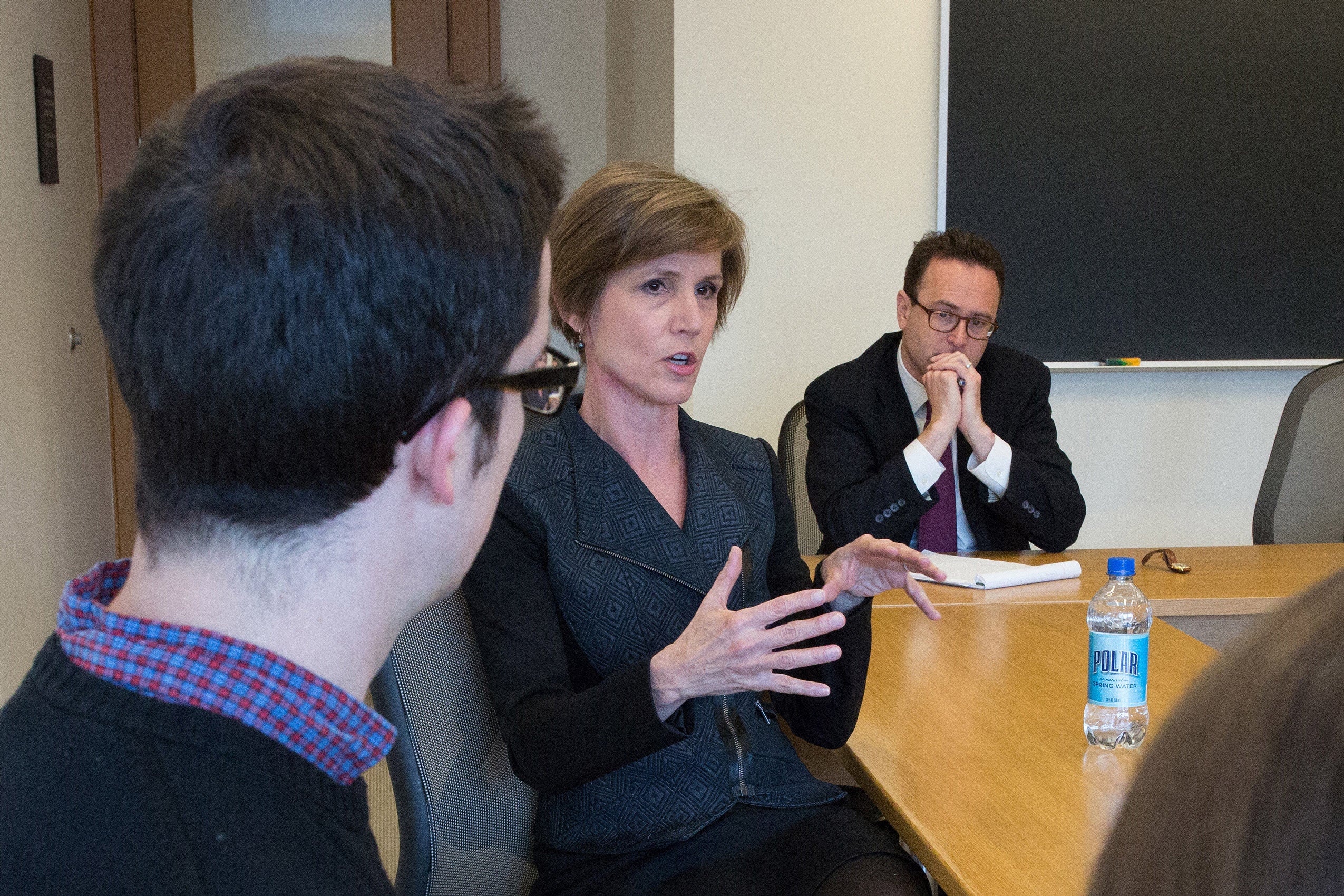With 11 days left in the presidency of Barack Obama ’91, Deputy Attorney General Sally Q. Yates spoke at Harvard Law School about recent strides in criminal justice reform and why she is optimistic that progress will continue in the new presidential administration.
Both Eric Holder and Loretta Lynch ’81, the two attorneys general who served under Obama, made significant reforms in federal sentencing and federal prison reform. Yates believes that momentum will continue. “Support for criminal justice reform isn’t limited to Democrats or liberals or any single interest group,” she said. “Rather, there is a strong, bipartisan consensus, from both ends of the spectrum and every point in between, that we need to adjust our approach. And that’s because fiscal realities, public safety, and basic fairness demand it.”
Yates addressed a group of Harvard Law students and faculty. Prior to her talk, she also met with students who work on the Clemency Initiative of the HLS Criminal Justice Policy Program (CJPP), which sponsored her talk. Those students helped prepare clemency petitions for people serving inappropriately long sentences, particularly those incarcerated for low-level drug offenses. Working under the supervision of attorneys, the students prepared clemency petitions for people serving lengthy or even life sentences for nonviolent drug offenses. Six of those petitioners had their sentences commuted by President Obama.

Yates praised the work of those students (see sidebar), and the work of the CJPP, which she said “has quickly established itself as a significant force in national reform efforts.”
A staunch advocate of reform, Yates was clear that she’s a career prosecutor who believes in “holding people accountable when they violate the law and victimize our fellow citizens.” She has served as deputy attorney general, the number-two post in the Justice Department, since 2015. Prior to that she was the U.S. attorney for the Northern District of Georgia, the office where she began her career in 1989. Looking back over her 27 years with the DOJ, Yates said that the criminal justice system went too far in responding to the wave of violent crime that was sweeping some cities when she began her career in Atlanta, then known as the most dangerous city in America. “We can’t jail our way into safer communities,” she said. “It takes an equal commitment to prevention and recidivism reduction.”
Many factors led to prison sentences that were too long, prisons that were too crowded, and an abandonment of prison rehabilitation and education programs. Significant stations along the way included President Nixon declaring the “War on Drugs” and harsh federal sentencing guidelines passed by Congress in 1984, primarily targeting drug dealers. Mandatory minimum sentences were based on the weight of drugs involved, to the exclusion of other factors. “While drug weight can be a useful proxy, it can’t distinguish between a cartel boss who needs to be in prison for a long time from the courier who doesn’t,” Yates said. The federal prison population swelled by nearly 800 percent between 1980 and 2013. At the same time, the cost to run the Bureau of Prisons (BOP) grew to one-third of the DOJ budget, at times costing as much or more as the entire Federal Bureau of Investigation.
The ballooning population spurred the BOP to turn to private prisons. At the same time, federal efforts to deinstitutionalize mentally ill people, combined with a lack of federal funding for community mental health treatment, contributed to growing numbers of mentally ill people in the prison population.
By the summer of 2013, the federal prison population hit its peak of nearly 220,000 inmates. On any given day, some 12,000 of them were being held in solitary confinement. Against that backdrop, Holder announced the DOJ’s “Smart on Crime” initiatives. It directed that “federal prosecutors focus our limited resources on cases that would have the greatest public safety impact to our communities and decline to charge certain low-level, non-violent drug offender with crimes that would trigger mandatory minimum sentences,” Yates said. The following summer, DOJ announced its clemency initiatives.
“These changes reflected an important recalibration in federal sentencing policy,” said Yates. And for the first time in three decades, the federal prison population began to decline. That, in turn, has freed up money the DOJ is devoting to additional reforms.
In August, Yates directed the BOP to reduce and eventually end the use of private prisons. “Profit and prison don’t go together,” she said.
With facilities less crowded, violent incidents in the institutions are decreasing, Yates said. And the DOJ is introducing new programs for inmate education and re-entry. “Research is clear that inmates who participate in meaningful correctional education have 43 percent lower odds of returning to prison than those who do not, and that every dollar spent on prison education saves four to five dollars on the costs of re-incarceration,” Yates said.
DOJ is also overhauling federal halfway houses, where 80 percent of federal prisoners go after release. They had been fully privatized, and Yates said, “We realized that this private market wasn’t functioning properly – there were no uniform standards for the operation of these facilities, and BOP was not collecting good data about which halfway houses were performing well and which ones were not.” In November, DOJ took a number of steps to address that, leveraging BOP’s purchasing power to impose standards and improve outcomes in that private market, Yates said.
Finally, Yates encouraged students to be active in criminal justice reform: “As current and future leaders in a profession dedicated to the integrity of the law, I hope that you will let your voices be heard and that you will demand meaningful change, and most importantly that you will act at every opportunity to effect the changes that are required to make our communities safer and our system more faithful to its core principle of justice.”
Read Deputy Attorney General Yates’ prepared remarks on the Department of Justice website.
